We can be grateful for the development of many amazing technical advances in medicine over the years. In many ways, the medical world has benefited from technology perhaps more than many other areas of life, and that benefit is passed on to us.
As people get older, they tend to struggle more with mobility. This is a worry for those of us who have family members of age living alone. If a loved one is infirm and insists on living in their own home – and who wouldn’t want to as long as it remains possible – then it’s even more of a worry to family and friends.
This is where the development of medical alert systems has been of great benefit. The fact is that these devices are not particularly sophisticated. Yet, they save lives, and potentially many of them. We’re going to look at types of medical alert systems, what you should be looking for if you are thinking of having one installed, and why cheap is not always good. Let’s start with the types of life alert services that are available right now.
Medical Alert Systems Explained
Note that we used the term ‘life alert services;’ this is because many medical alert systems go far beyond being simply a rudimentary alarm. They take on a more comprehensive form and deliver a solution that is fully backed up, 24 hours a day.
A medical alert system will usually consist of two parts for the home. One is the wireless hub, which plugs into the telephone system. The other is a pendant or ‘watch’ which is worn by the user. These two devices communicate using Wi-Fi.
Let’s say an elderly person suddenly feel ill and cannot get to the phone. They press the button on the pendant. This tells the hub to call a number that connects it to a computer in a control room. The number appears on the screen, an operator calls the number of the user. If they do not respond, the operator then informs the emergency services.
It’s a clever and efficient system that makes life a lot easier for people with elderly or infirm family members living alone.
Most systems will require the user to provide the numbers of three ‘responders.’ These will be a relative or friend, a neighbor perhaps, and the local police. These people will be notified of the potential problem immediately the call is made.
Another part of the routine is that should the user answer the call, the operator can then assess the situation and avoid the emergency services being called out when not necessary. Let’s look at what you need to be looking for when you are choosing the right system for your requirements.

What to Look for in a Medical Alert System
It’s worth remembering that you are buying this system not only to provide the patient with a means of communication when in trouble, but also to give you and your family added peace of mind that help can be there quickly when it is needed. Here are some of the features you should look for when researching the market.
- Always choose a service provider with a fully staffed remote control room that is manned 24 hours a day with trained operators.
- If possible, choose one of the more sophisticated systems that includes a fall sensor whereby the system informs the control room that the wearer has not moved for a long time when they normally would.
- Choose one that also alerts you or a carer when the system is activated.
- Look for an established operator with a good reputation – it’s worth asking around for personal reviews.
Basically, you want a quality device and first-class service, which brings us to our next point.
I’ve Seen One Really Cheap – Should I Buy It?
As with all markets, there are very cheap devices claiming to be lifesavers. Avoid them at all costs, as you need one that is reliable, is proven, and that will get help to the wearer in the quickest possible time. You will need to pay a regular service fee for the 24-hour cover, but you will find it worth the investment.
Choose the Right One for Your Peace of Mind
This is one product where you really should spend money on the best you can afford in the market. You need to be reassured that what you are getting is the real deal, so don’t skimp, and take your time to do your research. Also, make sure your patient’s telephone connection is up to date, and some of these work via broadband so consider that too. Medical alert systems are worth the small investment when you want your loved one to be protected at all times when you are not present.
This post has been sponsored by The Outreach Services
Digital Health Buzz!
Digital Health Buzz! aims to be the destination of choice when it comes to what’s happening in the digital health world. We are not about news and views, but informative articles and thoughts to apply in your business.


